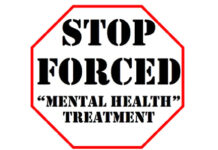Hearing Voices Workshop Comes to Vermont
I recently had the great pleasure of hosting a Hearing Voices workshop with Ron Coleman and Karen Taylor. The response was overwhelmingly positive. Many people described this as one of the best trainings they had ever attended. Ron's message is inherently uplifting - after all this internationally known educator was once a mental patient given a poor prognosis. But in addition, they offered pragmatic suggestions for how to think about voices and talk to someone who is experiencing them.
And They Said it Wouldn’t Last – Rethinking Psychiatry Celebrates its 7th Year
Rethinking Psychiatry is proud to continue the work that began in 2010 in Portland, and we look forward to many more years of challenging the dominant paradigm in mental health and providing new perspectives and solutions.
Mad Economy: Let’s Change the World!
Everyone in the world is either touched by their own mental health issues or have had a family member affected. What if they directed their buying power to an organization that would use the profits to fund exciting mental health & recovery projects both in the developing world and in their own countries; projects that would be ethical, non-coercive, personal recovery-based, and were aimed at creating recovery communities? What if they could buy products, crafts, services, art, music, books from people who had experienced mental health issues, enabling them to set up their own businesses or buy from social co-operatives that enabled distressed people to work and earn a living wage?
Feral Psychiatry: The Case of Garth Daniels
Garth Daniels, a 39-year-old Melbourne man, has been shackled for 110 days and forced to undergo ECT 94 times at three times a week against his will. Last year, his family asked me to provide a second opinion on Garth’s case. As predicted, my recommendations against continued ECT were quickly dismissed by the hospital. There are critically important issues at stake in this case.
Study Examines Women’s Experiences of Hearing Voices
An international group of researchers from multiple disciplines has published a historical, qualitative, and quantitative investigation into voice-hearing in women. The interdisciplinary project, freely available from Frontiers in Psychiatry, explores how sexism, exploitation, and oppression bear on women’s’ experiences of hearing voices.
Announcing an International Symposium and Institute on Psychiatric Drug Risks and Withdrawal
I have given up on psychiatry as a system capable of “being there” for people who are dealing with life and death issues. Psychiatry as a system of care lacks validity. Every day — unfortunately — we learn of new examples proving this statement. But here's the good news: every day we meet people who show us that the predictions of psychiatry are not true; that there are “cures,” that it is possible to reduce or withdraw psychiatric drugs.
CRPD Absolute Prohibition Campaign and Course
For a long time I have been interested in offering a course on CRPD (Convention on the Rights of Persons with Disabilities) to pass on my knowledge to other activists and allow more people to take up the frustrating and passionate responsibility of human rights work. Finally I have come up with a plan that is doable.
REFOCUS Psychosis Recovery Intervention Ready for Trials
A new pro-recovery manualized intervention – called the REFOCUS intervention – has been developed and will now be evaluated in a multisite randomized control trials. The strengths-based intervention, which focuses on promoting relationships, is outlined in the latest issue of the British Journal of Psychiatry.
Berlin Manifesto for Humane Psychiatry Released
Changing the mental health and psychosocial support system in Germany requires public debate about the ways our society should help and support people in mental crisis and with chronic mental health problems. We believe the driving force behind all help and support should be humanitarianism and respect for inalienable human rights.
Rethinking Psychiatry Teaches about Despair, Resilience, and the Great Turning
Rethinking Psychiatry is an independent, grassroots group in Portland, Oregon that advocates for a paradigm shift in mental health care. On January 20, we hosted a film and discussion by activist and artist Barbara Ford. The subject was “Despair and Resilience: How to Face this Mess We’re in Without Giving Up.” Ford also showed film called Joanna Macy and the Great Turning, featuring philosopher, writer, and activist Joanna Macy.
Pushing for an Informed Consent Benzo Bill in Texas
Dr. Raymond Armstrong and I are currently working together to push Texas lawmakers to adopt restrictions on the prescription of benzodiazepines and sleep drugs. We feel fortunate to be able to draw from the experience of the benzo movement in Massachusetts, and we are grateful for the information that long time advocates like Geraldine Burns have provided us.
ECT Day of Protest: Time for You to Take Leadership
Work on the May 16 International Day of Protest Against Shock Treatment is moving right along. This spontaneously-organized, grassroots effort now includes 21 cities in 16 states, plus two each in Canada and the United Kingdom. There will also be demonstrations in Ireland, New Zealand, and Uruguay. We CAN win, and you CAN be a leader.
Update: Massachusetts Benzodiazepine Bill Hearing
The hearing for Bill H4062: Informed Consent for Benzodiazepines and Non-benzodiazepine Hypnotics took place on Monday – in the middle of an April snowstorm! The discussion clarified some important points in the legislation and gave survivors an opportunity to tell their stories. I was so proud to be there and witness the courage, camaraderie, resilience, advocacy, and vulnerability of fellow survivors. This legislation is our chance to be heard. As one survivor said, through tears, to the committee, “Do not let my suffering be in vain. I beg you to pass this bill.”
Call to Action: Support a Bill for Informed Benzodiazepine Use
Massachusetts Bill HD 4554 needs to gain sufficient state representative support by Tuesday, March 1, 2016. This bill will put restrictions on the prescribing of benzodiazepines and non-benzodiazepine sleep aids, and will require that all patients be informed of the potential dangers of these drugs, specifically the dangers of long-term use.
The Curious Case of over 50 Consecutive ECTs in Melbourne
Over the past few weeks I have been witness to, and increasingly involved in trying to stop one of the most extreme examples of psychiatric brutality I have encountered in my 40 years in this field. And I have encountered quite a few. I suggest you sit down before watching and reading. This is not your usual, run-of-the-mill psychiatric abuse story.
The Time to Curb Forced Drugging is Now: In Your State, and Nationally
Is the time ripe for MadinAmerica readers to organize legislative action to curb the use of drugs as chemical restraints? Recent developments in Congress, in the state of Washington, and in California suggest that the answer is yes.
Shock Device Safe As Eyeglasses? 89 Days to Say No
We now have only 89 days to respond to Docket No. FDA-2014-N-1210. Tell the FDA no to the down-classification of shock devices. Tell the FDA exactly how subjective and damaging the terms “treatment-resistant” and “require rapid response” are, and how they fail as legitimate medical concepts. The known risks of electroshock should not be ignored because one has been psychiatrically labeled.
The Case of the Missing Schizophrenia
This past Thursday I attended the American Psychiatric Association's Institute for Psychiatric Services in San Francisco, and then a talk by the Bay Area Mandala Project on "Providing Loving Receptivity Can Help People in Extreme States." I would like to thank both groups for the motivation to publish this — particularly as they would seem to be at odds in the reductionist "dialogue" we so often have — but really aren't so different in my mind for reasons discussed herein: Who is not "in crisis" for questioning their identity and fit within dominant paradigms?
Einstein, Social Justice and The New Relativity
To create his theory of relativity, Einstein had to see things differently. He used imagination and empathy to come to know a new 'reality' of existence. In this essay, we delve deeply into the nature of human experiences that lead to public concern and discover ourselves in a whole new realm.
Hearing Voices, Emancipation, Shamanism and CBT: Thoughts After Douglas Turkington’s Training
When Doug Turkington, a UK psychiatrist, first announced to his colleagues that he wanted to help people with psychotic experiences by talking to them, he was told by some that this would just make them worse, and by others that this would be a risk to his own mental health, and would probably cause him to become psychotic! Fortunately, he didn’t believe either group, and in the following decades he went on to be a leading researcher and educator about talking to people within the method called CBT for psychosis.
Open Dialogue Approach Reduces Future Need for Mental Health Services
The Open Dialogue psychiatric treatment approach is associated with reduced utilization of mental and general health services for Danish youth.
Inner Fire: Healing and Recovery Without Meds
For five years, I and others worked to create a residential healing community in Brookline, Vermont, where people could recover from debilitating and traumatic life experiences, which often lead to addiction and mental health challenges, without the use of psychotropic medications. We welcomed our first six seekers to a yearlong, therapeutic and farm-based, day program last September, and we now can report on what we have learned during this time.
“Hearing Voices: The People Who Say Talking Back is the Only Answer”
Journalist Emma Reynolds profiles Amanda Waegeli, Ron Coleman, Nathan Grixli and Lyn Mahboub about their experiences coming to the Hearing Voices Network (HVN). HVN was established 10 years ago in Australia and provided a support group that encouraged people to listen to their voices rather than trying to block them out. The group now operates in 25 countries.
Call To Action: Massachusetts Bill H4062 for Informed Benzodiazepine Use is Official
On February 24th, 2016 Bill HD4554 - An Act relative to benzodiazepines and non-benzodiazepine hypnotics was filed by Representative Paul McMurtry in the Massachusetts State House. The bill received 47 co-sponsors during the seven-day open period in which legislators can co-sponsor. This is an impressive and promising turnout.
Launching Our Peer Respite Initiative
This week we launched PeerRespite.net, a website dedicated to information and resources regarding peer respites in the U.S. As part of the initiative, recruitment is open for the 2015 Peer Respites Essential Features Survey.













